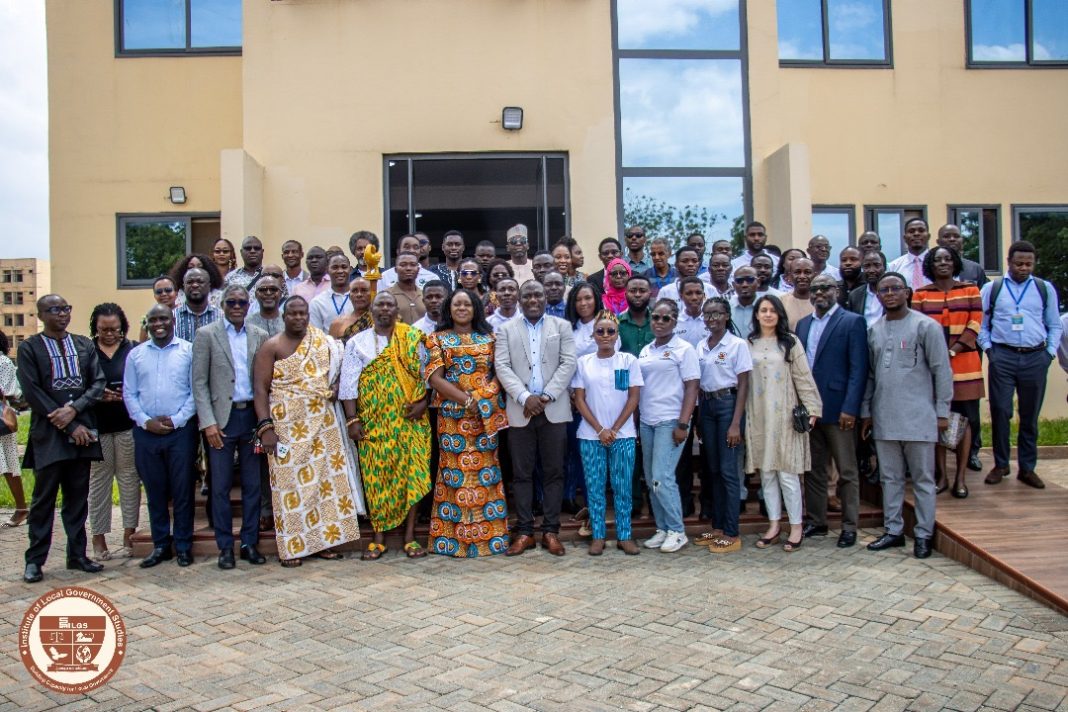By Albert Allotey
Accra, June 24, GNA – The Policy Action Research on Youth Economic Inclusion through Next-Generation Local Economic Development (NGLED), started by the Institute of Local Government Studies (ILGS) in March 2024, has been officially launched.
The ILGS with support from the Knowledge Platform on Inclusive Development Policies (INCLUDE) is implementing a three-year (2024-2026) policy action to analyse the entrepreneurial and intrapreneurial behaviour among young people and local government officials in five selected Municipal and District Assemblies in the country.
The Assemblies are the Sekondi/Takoradi Municipal Assembly, Komenda/Edina/Eguafo/Abirem Municipal Assembly, Awutu Senya East Municipal Assembly, Nsawam Adoagyiri Municipal Assembly, and Atiwa District Assembly.
The ILGS facilitated the setting up of five business youth groups in the selected districts and provided capital support ranging from GHS 60,000 to GHS75,000 per group as well as mentorship, training, formalisation, and market access and established special purpose vehicle (SPV) to manage the process, among other things.
The groups are into poultry, fish farming, and livestock rearing.
The launch of the project was to showcase the five youth businesses under the NGLED action research to government, development partners and members of the INCLUDE knowledge platform from other African countries.
The preliminary findings of the research would be used to inform government policy on local economic development, youth enterprises and the ‘Adwumawura.’
Madam Rita Naa Odoley Sowah, the Deputy Minister of Local Government, Chieftaincy and Religious Affairs performed the launch on behalf of the sector minister, Mr Ahmed Ibrahim.
in a speech read for him, Mr Ibrahim described the project as a holistic model for sustainable youth entrepreneurship and local economic development.
He said, “It is important to highlight that this initiative is not operating in isolation but grounded in the Local Economic Development Policy (2024-2029) launched last year by the Ministry of Local Government, Chieftaincy and Religious Affairs.”
He noted that the policy provided a strategic framework for transforming the Metropolitan, Municipal, and District Assemblies (MMDAs) into engines of economic growth.
Mr Ibrahim said the NGLED was aligned seamlessly with the broader vision of President John Dramani Mahama, particularly the Adwumawura Programme and the 24-Hour Economy Policy.
“These government flagship programmes aim to create 10,000 youth-led businesses annually, establish a microcredit institution with seed fund of GHS750 million, promote graduate cooperative for public and private businesses, and scale up district-level enterprises while supporting artisans with start-up kits,” he stated.
The Minister reaffirmed government’s unwavering commitment to embedding job creation at the heart of local governance and called on all stakeholders, international and local development partners to rise to action.

He urged MMDAs to embrace their roles as economic enablers and leaders while encouraging the youth to be pioneers of new economic future for their communities and Ghana as whole by seizing the opportunities being created.
Professor Nicholas Awortwi, the Director of the ILGS, in a welcoming address, said the ILGS and other institutions since 2019 had argued that Ghana’s decentralisation and local governance must shift and consider the adoption of Democratic Developmental Local Governance agenda.
“Democratic developmental local governance system prioritises local democracy and local economic development as key focus of decentralisation in a country, and that developmental local government promotes local industry policy, job creation, income growth and manages municipality as a business and not bureaucracy,” he stated.
Prof Awortwi said through the study the ILGS aimed to socially engineer a change in ideology and strategy of local governments in pursuit of local economic development based on the principles that “It is the business of local governments to do business in partnership with young people to create jobs and improve their income levels.”
“In this approach, the local governments directly support young people in productive economic activities, encourage youth partnerships and provides entrepreneurial support and business development through coaching and mentorship,” he added.
The occasion was used to present Business Registration Certificates to the five Youth Business Groups.
GNA
Christian Akorlie
